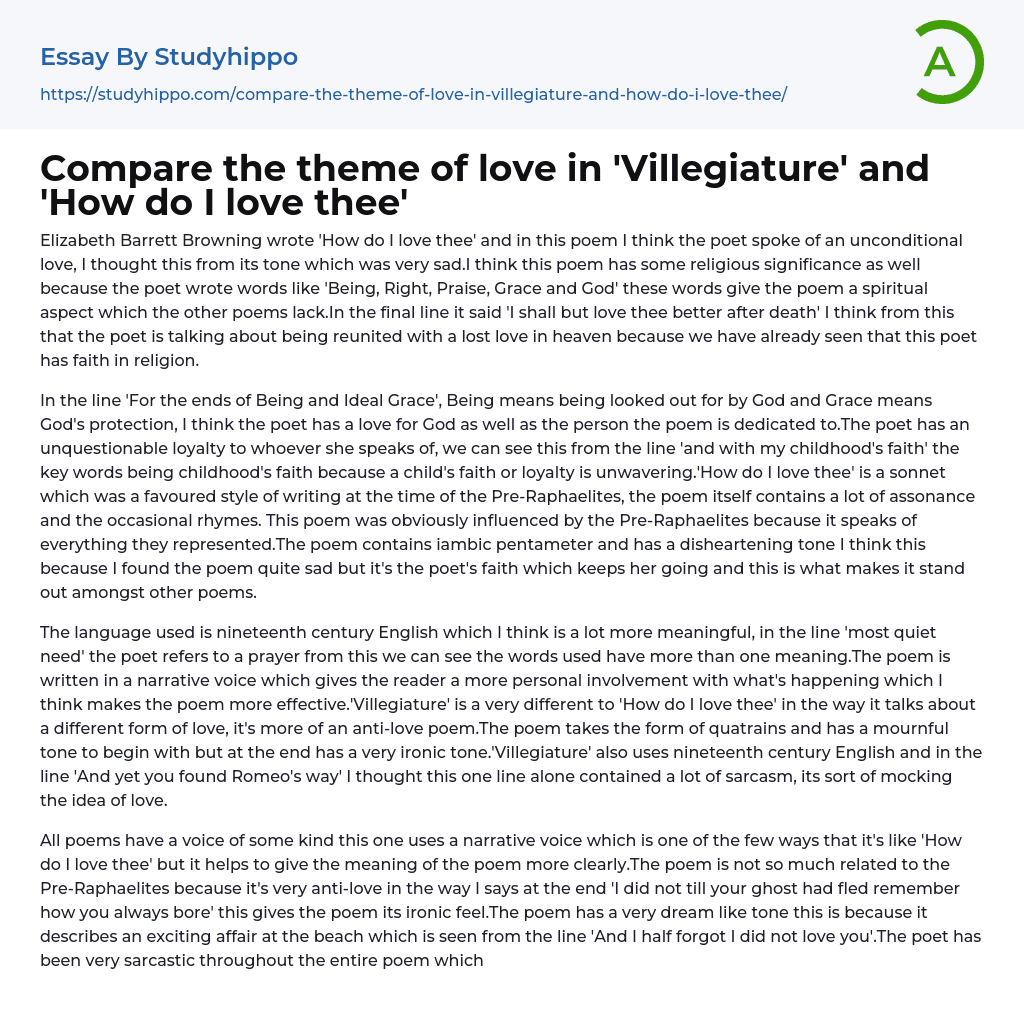

Compare the theme of love in ‘Villegiature’ and ‘How do I love thee’ Essay Example
In 'How do I love thee', Elizabeth Barrett Browning expresses an unconditional and melancholic love. The poem also contains spiritual themes evident in words such as 'Being', 'Right', 'Praise', 'Grace' and 'God'. The final line, 'I shall but love thee better after death', suggests the idea of reuniting with a loved one in heaven, reflecting the poet's religious belief.
The poet expresses her love for God and the person being addressed in the poem through the line 'For the ends of Being and Ideal Grace', where 'Being' represents God's watchful care and 'Grace' signifies His protection. Her unwavering loyalty to the addressee is evident in the phrase 'and with my childhood's faith'. The poem 'How do I love thee' is a sonnet, a style of writing favored by the Pre-Raphaelites, whose influence can be
...seen in its content. The poem uses assonance and occasional rhymes, as well as iambic pentameter, creating a disheartening tone. Despite this, it is the poet's faith that gives her strength, making this poem stand out from others.
The poem 'Villegiature' is written in nineteenth century English, which provides it with deeper meanings. This can be seen in the line 'most quiet need', where the words used have more than one interpretation, as they also refer to a prayer. The narrative voice used by the poet generates a personal connection between the reader and the events taking place, making the poem more impactful. The poem is dissimilar to 'How do I love thee' since it portrays a different kind of love, an anti-love poem of sorts. It is structured in quatrains and commences with a funereal tone, bu
ultimately ends on an ironic note. The nineteenth century language used in 'Villegiature' is demonstrated by its sarcastic line, 'And yet you found Romeo's way', which humorously mocks the notion of love.
All poems have a voice and this one uses a narrative voice, similar to "How do I love thee," to clearly convey its meaning. While not typically Pre-Raphaelite in theme, the poem's anti-love sentiment is highlighted in the line "I did not till your ghost had fled remember how you always bore," adding an ironic touch. The dream-like tone emerges from descriptions of an exciting beach rendezvous, and the poet's sarcasm is evident throughout, as seen in the line "Deep in dull books had hardly missed me," revealing a deep understanding of neglected love.
'Remember' is a melancholic poem written in anticipation of death, and it centers on an unrealistic love. The line 'Gone far away into the silent land' serves as a metaphor for death, which heavily influences this poem, as metaphors abound. The poet describes a selfless love in the line 'Yet if you should forget me for a while and afterwards remember do not grieve', in which they assert that there is no need to feel guilty for forgetting them. This line alone encapsulates the poem's message. Additionally, the poet believes that it's better to have loved and lost than to never have loved at all; this sentiment is expressed through the line 'Better by far you should forget and smile than you should remember and be sad', which suggests that if thoughts of the poet bring sadness, it is better to forget and be happy.
The poem "Remember" embodies the perfect
form of love, reflecting the ideals of the Pre-Raphaelite movement. The first-person perspective is common to all three of the poems, each addressing a different facet of love. Of the three, "Villegiature" resonated most with me, as it depicts a love that endures to this day. "How do I love thee" illustrates the loyalty inherent in love, as evidenced by the line "I shall but love thee better after death," which I interpret to mean a union in heaven after one partner has passed away.
'Remember' highlights the purity of love, as evidenced by the line 'Nor I half turn to go yet turning to stay,' meaning that after death, the speaker cannot choose to remain. This encapsulates the poem's theme of a love so strong that the poet is willing to be forgotten. 'Villegiature' portrays a love that no longer exists, but stands out as a light-hearted love poem, which was a surprising find for me.
- Afterlife essays
- Atheism essays
- Bible essays
- Buddhism essays
- Christian Worldview essays
- Christianity essays
- Confession essays
- Cosmological Argument essays
- Deism essays
- Devil essays
- Existence of God essays
- Faith essays
- Freedom Of Religion essays
- God essays
- Hinduism essays
- Immortality essays
- Islam essays
- Jainism essays
- Jews essays
- Judaism essays
- Miracle essays
- Monk essays
- Monotheism essays
- New Testament essays
- Old Testament essays
- Pilgrimage essays
- Puritans essays
- Revelation essays
- Ritual essays
- Salvation essays
- Sin essays
- Sinners essays
- Soul essays
- Taoism essays
- Temple essays
- Theology essays
- Adoption essays
- Aunt essays
- Babies essays
- Bedroom essays
- Caring essays
- Children essays
- Daughter essays
- Divorce essays
- Dog essays
- Dysfunctional Family essays
- Family Tradition essays
- Family Values essays
- Father essays
- Foster Care essays



